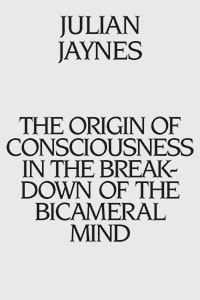
Another excerpt from a great Chronicle of Higher Education feature on What Book Changed Your Mind?
"For me, that book was by Julian Jaynes. The Origin of Consciousness in the Breakdown of the Bicameral Mind (1976) is one of those lush, overambitious books that gets many things wrong, but in such an interesting way that readers, on finishing it, find that they think about the world quite differently. At least I did, although I think the book crept up on me year by year until I suddenly decided that this odd book I’d read in college had a fundamental insight—and had presented to me the puzzle that became my life’s work.
Jaynes taught psychology at Princeton, back in the days before psychologists had walled themselves off from literature, and he noticed that in the Homeric epics, the gods took the place of the human mind. In the Iliad we do not see Achilles thinking. Achilles acts, and in moments of strong emotion, he acts as the gods instruct him. When Agamemnon steals his mistress and Achilles seethes with anger, Athena shows up, grabs him by the hair, and holds him back. Jaynes argued that Athena popped up in this way because humans in archaic Greece had no words for inner speech. So when they felt compelled by this strong internal force, they attributed that sensation to the gods. "The gods take the place of consciousness."
Moreover, Jaynes thought that in these moments, the ancient Greeks heard with their ears the gods speak. He thought that the inability to name the sensation as internal altered the sensation so that in moments of powerful feeling, moments when one feels pushed from within by one’s own overwhelming rage or joy, the Greeks heard the cognitive trace of that emotion audibly, as if it were coming from outside. "Who then were these gods that pushed men about like robots and sang epics through their lips? They were voices whose speech and direction could be as distinctly heard by the Iliadic heroes as voices are heard by certain epileptic and schizophrenic patients, or just as Joan of Arc heard her voices."
Well, maybe yes and maybe no. To me the point was that the way we pay attention to inner sensation changes the nature of the sensation, sometimes profoundly. The way we recognize mental events and deem them significant, the way we reach for what we take to be real—those differences shape what we know of God and madness.
The book begins: "O, what a world of unseen visions and heard silences, this insubstantial country of the mind!" I feel drab in Jaynes’s company. I just want to get the facts right. But this was another of his lessons. He taught me that data can sing.
—T.M. Luhrmann is a professor of anthropology at Stanford University."
See here for an earlier post on this book.
No comments:
Post a Comment
Note: Only a member of this blog may post a comment.